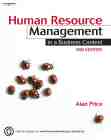Employee Involvement, Employee-Centred Management and Empowerment
Adapted from Human Resource Management in a Business Context, 3rd edition (2007)
Schuster (1998) asks why managers have been so slow in adopting employee-centred
management? He postulates five main reasons:
1. Complacency and inertia. He argues that, until recently, many executives
had never questioned or considered changing the fairly comfortable status quo.
2. The short-term focus of 'management systems in general, and reward systems
in particular.' Executive performance bonuses and incentive plans are tied to one year - and
certainly not aimed at building a committed workforce over the long-term.
3. Inability to measure the impact of HR practices. Schuster contends that: "Until
recently, little attention has been paid to executive performance regarding effective
utilization of human resources, in part because standards for comparison did not exist. Our lack
of control (original emphasis) over the efficient utilization of the most expensive
single cost of operation in many organizations is indeed remarkable."
4. Reluctance to give up their special status, executive privileges and managerial power.
5. Perhaps the most significant explanation of all - that many managers would
like to introduce high-involvement practices 'but are unsure how to begin or exactly how to
proceed.'
Fisher (1999:3) states that things have changed:
"Empowerment has clearly become the latest in a long litany of vogue practices
that have ebbed and flowed over corporations like the changing of the tide. Today it is estimated that
virtually every corporation in North America and Western Europe is using various forms of
empowerment somewhere in their organization. Many even utilize an advanced form of empowerment
called self-directed work teams (SDWTs) - now more commonly called
." In fact, SDWTs are in a direct line of descent from the 'socio-technical
systems' of the 1950s.
Fisher argues that companies which take this seriously consider empowerment
to be more than a passing fad. He also sees the team leader as a key role in the
empowerment process. In the past they would have been supervisors, 'foremen', or managers.
Now they may have titles including terms such as facilitator or advisor and
lead, coach, or train rather than plan, organize, direct,
or control. Under the traditional form of management, supervisors would control subordinates
by telling them what to do. In other words, the supervisor was the boss. Fisher contends that
all traditional managers are supervisors. For empowerment to take effect, they must become team
leaders.
Fisher (1999:11) justifies this by saying that: "Competitive advantage comes from fully
utilizing the discretionary effort of the workforce, not from buying the latest gadget
or using the latest management fad. Voluntary effort comes from employee commitment, and commitment comes from
empowerment."
So what is empowerment? Murrell and Meredith (2000:1) define empowering as:
"... mutual influence; it is the creation of power; it is shared responsibility; it is vital
and energetic, and it is inclusive, democratic and long-lasting."
They argue that empowerment implies a finished process, a state of constancy.
Whereas: "Empowering ... suggests action - enabling the growth of individuals and organizations
as they add value to the products or services the organization delivers to its customers, and
the promotion of continuous discovery and learning."
For Murrell and Meredith managers in an empowering organization:
* Believe that leadership belongs to all employees - and not just a few.
* Know that the company is most likely to succeed when employees have the tools,
training and authority to do their best work.
* Understand that information is power - and share it with all employees.
* Value employees enough to build a culture that values and supports individuals.
* Create opportunities for finding solutions and for designing what-can-be -
not searching for problems and what-should-have-been.
* Understand that fostering empowerment is a continuous effort - not an endpoint
to be checked off a list of objectives.
References
Fisher, K. (1999), Leading Self-Directed Work Teams, McGraw-Hill.
Murrell, K.L. and Meredith, M. (2000), Empowering Employees, McGraw-Hill.
Schuster, F.E. (1998), Employee-Centered Management: A Strategy for High Commitment and Involvement, Quorum Books.
This article is based on Human Resource Management in a Business
Context by Alan Price (3rd edition, 2007)
.



